| Image | Name | |
|---|
Four Moderators, beginning in 1963
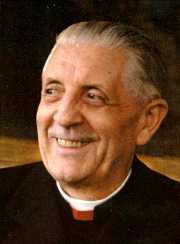
|
Leo Joseph Suenens, Mechelen-Brussels, Belgium
|
|

|
Julius Döpfner, Munich
|
- Wrote dissertation on John Henry Cardinal Newman at Pontifical Gregorian University in 1941.
- Orchestrated Fulda Conference for German-speaking & north European fathers, summer 1963.
- 1963 Removed chapter on religious from schema on Church. Very high-handed with religious fathers in hall. Relented after 679 fathers complained.
|

|
Giacomo Lercaro, Bologna, Italy
|
- Appointed to Consilium ad exsequendam Constitutionem de sacra Liturgia with two Cardinals from curia, Arcadio Larraona Saralegui (Spanish), prefect of the Sacred Congregation of Rites & Paolo Giobbe (Roman), datary of His Holiness. See also Ferdinando Antonelli.
- Popularized the expression Church of the Poor.
|
.jpg)
|
Grégoire-Pierre Agagianian, Armenian Catholic, Cilicia
|
- Regarded by liberals as the most acceptable of the curial cardinals.
- President of Commission on Missions
|
Prominent
| Image | Name | |
|---|

|
Augustin Bea, German.
|
- Biblical scholar
- President of Secretariat for Promoting Christian Unity
- Confessor of Pope Pacelli
|
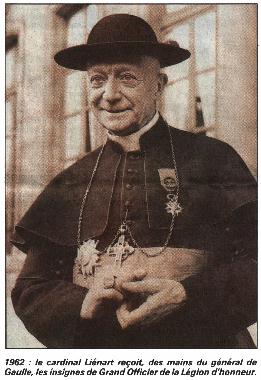
|
Achille Liénart, Lille, France.
|
- Seized mic [from Felici, who was speaking for ten Council Presidents] on first day, 13 Oct 1962, to insist that bishops be allowed to compile their own lists of commission candidates.
|

|
Bernardus Alfrink, Utrecht
|
- October 30, 1962 When Ottaviani, speaking about Schema V, the liturgical schema, (without text because of partial blindness) exceeded 10 minutes, Alfrink signaled to a technician to turn off the mic. Council fathers clapped with glee.
|

|
Josef Frings, Cologne, Germany.
|
- Having previously consulted Liénart, supported him in confrontation on first day.
- Commissioned new professor, Fr. Ratzinger, to write paper before council; being much impressed, took Fr. Ratz with him as peritus.
- Through charitable organizations, such as Misereor & Adveniat, with the help of Fr. Ivan Illich, channeled money to South America, winning many allies as a result.
|

|
Paul-Émile Léger, Montreal, Canada.
|
- In remarks on schema about priestly formation (Optatam totius), argued that St. Thomas should be admired as exemplar of engagement with pagans.
- Argued for dramatically simplified Divine Office
- Argued that membership in college of bishops founded on ordination alone, for both titular & diocesan bishops.
- Diaconate?
|

|
Franz König, Vienna, Austria
|
- President of the papal Secretariat for Non-Believers from 1966 to 1981
- Significant contributor to Nostrae aetate
- König's wanted to ensure that Communism and the Catholic Church were capable of co-existing peacefully. He established himself as an important authority on the matter; he was often asked by the Vatican to make diplomatic trips to Communist countries, on occasion establishing useful relationships with Communist authorities.
|

|
Hélder Câmara Recife, Brazil
|
|

|
Eugène Tisserant, French, Roman Curia.
|
- Participated in negotiating a secret 1960s agreement between Soviet and Vatican officials that authorized Eastern Orthodox participation in the Second Vatican Council in exchange for a non-condemnation of atheistic communism during the conciliar assemblies.
|

|
Johannes Willebrands, Utrecht.
|
- On 28 June 1960, Pope Roncalli nominated him Secretary of the newly established Secretariat for Promoting Christian Unity.
- He was instrumental in persuading the Orthodox churches to attend the sessions of the Second Vatican Council as observers.
|

|
Pericle Felici, Roman
|
- Judge on Roman Rota
- Latin was his hobby; he published several volumns of Latin poetry.
- In 1959 & 1960 collected suggestion from bishops requested by Ante-Preparatory Committee into 16 volumes, 10,000 pages
- General Secretary of Central Preparatory Commission & Council
- Very popular. Received huge applause at end of council.
|

|
Emile-Joseph De Smedt, Brugge, Belgium.
|
- Member of Secretariat for Promoting Christian Unity
- November 1962, De Smedt argued against Schemata I-IV on grounds that Secretariat for Promoting Christian Unity wasn't involved in drafting. He said, to much applause, that those schemata must be rewritten or the Council will crush "a great and immense hope ... that now finally some serious and notable steps will be taken in the direction of fraternal unity."
- Argued that college of bishops had always existed, but modern communications made it more practical.
- After announcement by Tisserant that substantial changes to decree on religious liberty (Dignitatis humanae) required delay, De Smedt received sustained, thunderous applause when he argued that the decree was clarified but not so altered as to be a new schema.
|

|
Patriarch Maximos IV Saigh, Antioch
|
- Addressed council in French
- Argued against Latin & for vernacular in liturgy
- Wrote to Pope Roncalli in October, 1959 that Eastern Catholic Church represented hope of reunion between Orthodox Christians & Rome. Argued that Patriarchs should not be seated after Cardinals.
|

|
Stefan Wyszyński, Warsaw
|
|
.jpg)
|
Amleto Cicognani, Italy
|
- Secretary of State, 1961-1969
- President of Commission for the Oriental Churches (Catholics who follow Eastern Rites)
|

|
Dino Staffa, Italian
|
- Argued against collegiality, pointing out that collegiality had been opposed by Fathers, Pontiffs, provincial synods, Doctors, theologians, canonists, & norms of ecclesiastical discipline.
- Quoted Italian Jesuit Fr. Giovanni Bolgeni (1733-1811), pointing out that his positions, rejected for years, were now become the foundations of a Council schema.
- Operation Staffa: After gaining 70 signatures but being refused right to address hall, & upon hearing that their objections were being ignored by the subcommission on collegiality of the Theological Commission, sent a letter to Pope Montini. When he was convinced that he had been deceived by deliberate use of ambiguous language, Montini wept. Hence, the Explanatory Note.
|
|
|
|
|
|
|
|
|
| Image | Name | |
|---|
Conservatives

|
Michael Browne, Ireland; Dominican
|
- Vice President of Theological Commission
- Objected to language in schema on lay apostolates that said everyone must receive training in the apostolate. That claim was "too categorical."
|

|
Giuseppe Siri, Genoa
|
|

|
Alfredo Ottaviani, Italian
|
|

|
Ernesto Ruffini, Palermo
|
|
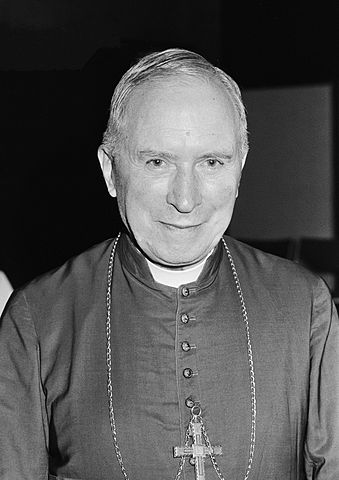
|
Marcel Lefebvre, French
|
- As apostolic delegate before council, founded bishops' conferences in Madagascar, Congo-Brazzaville, Cameroun, & French West Africa.
- Argued against collegiality not as threat to Pope, but as threat to pastoral responsibility & teaching authority of individual bishops. He saw it as a new kind of collectivism in the Church, silencing individual bishops.
|

|
Geraldo Sigaud, Diamantia, Brazil
|
- 1964 Formed Coetus Internationalis Patrum
- 1963 Argued against collegiality
|

|
Antonio Bacci, Italian
|
- Considered best Latinist in the Vatican
|

|
Antônio de Castro Mayer, Campos, Brazil
|
- In press conference Nov 7, 1962 expressed doubt that spiritual revival would follow from introduction of the vernacular in the Mass, as some had claimed.
- For example, German-born Wilhelm Duschak of Calapan vicariate in Philippines argued that entire Mass should be said aloud in the vernacular facing the people. "I believe it is also likely that if the world receives such an ecumenical form of the Eucharistic celebration, the faith of non-Catholic Christian communities in the sacramental presence of Christ might be renewed or even rectified." Duschak conceded that the suggestion did not come from people in his charge, but insisted that they would accept changes if implemented. Wiltgen, 39.
|

|
Luigi Carli, Segni, Italy
|
- Döpfner said there was no bishop at council whom he feared more.
|

|
Francis Spellman, New York
|
- 1963 Questioned whether titles such as Coredemptrix & Reparatrix used by popes should be passed over in silence simply because Protestants might have trouble understanding.
- 1963 Argued against collegiality & permanent diaconate.
- 1964 Member Coetus Internationalis Patrum
- Regarding schema on religious life (Perfectae caritatis), indicated that there were more than 8,000 women religious in New York, many of whom were distressed by reformers such as Suenens.
- Regarding schema on religious education (Gravissimum educationis) argued that, since role of state is to promote civil liberty, the state should provide financial aide to parents who would send their children to Catholic shcools.
|

|
John Heenan, Westminster
|
- 1964 Organized opposition group called St. Paul's Conference
|

|
Philip Hannan, New Orleans
|
- 1964 Organized opposition group to modify sections on war in Schema XIII
|
|
|
|
|
|
|
|
|
| Image | Name | |
|---|
Other Participants

|
Franz Zauner, Linz Austria
|
- Member of Preparatory Commission on Liturgy
- Received over 2,000 votes for seat on Liturgical Commission in October 1962, the highest number received by any Council father for any commission.
|

|
Joseph Schröffer, Eichstätt, Germany
|
- Elected to Theological Commission with highest number of votes.
|
.jpg)
|
Ferdinando Antonelli, Italian
|
|

|
Ivan Illich, Austrian
|
|

|
James Francis McIntyre, Los Angeles
|
|

|
Albert Meyer, Chicago
|
- Argued for NT basis of collegiality. 1963
|
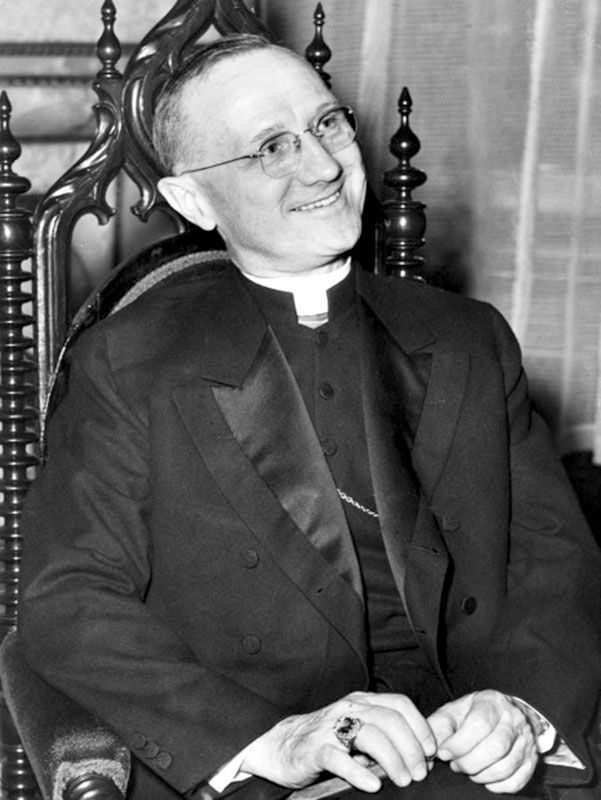
|
Joseph Ritter, St. Louis, Missouri
|
- In November 1962, joined attack on preparatory commission's Schema I, Sources of Revelation.
|

|
Léon Elchinger, Strasbourg
|
|

|
Paul Hallinan, Atlanta, GA
|
- Commission on Sacred Liturgy
|

|
Frederick McManus, CUA
|
- President of North American Liturgical Conference
- Liturgical peritus for U.S. bishops
- He presided at the first English Mass in the United States in 1964 in St. Louis, MO.
- When Carli indicated that the vote on the decree on religious liberty (Dignitatis humanae) would be delayed, McManus hurriedly consulted with Meyer & then produced Instanter, instantius, instantissime petition to Montini. Meyer, Ritter & Léger immediately left hall & went to see Montini.
|

|
Arcadio Larraona, Spain
|
- President of Sacred Congregation of Rites from 1962 to 1968
- President of Commission on Sacred Liturgy
|

|
Francis Simons, Indore, India
|
- Simons was born in Nederlands, studied at Gregoriana in Rome, ordained in Rome.
- 1963 Argued that curia was not representative, not aware of local conditions.
|

|
Franz Hengsbach, Essen, Germany
|
- Elected to Commission on the Apostolate of the Laity with highest number of votes.
|

|
William Conway, Armagh
|
- Objected to Schema XIII (Gaudium et spes):
- It should explicitly indicate that it stated only part of what Church had to say to modern world;
- It should not be silent about large parts of Church in chains in the world;
- It should not be silent about commercialization of sex & desecration of love in mass media.
|
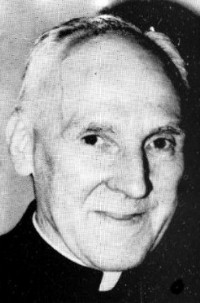
|
Gabriel-Marie Garrone, Toulouse
|
- Discussing schema on priestly formation (Optatam totius), argued that programs of priestly formation should be drawn up in each country by the episcopal conferences concerned. Further, the Sacred Congregation of Seminaries & Universities should include men from all over the world so that it might better know the conditions of priestly life.
- Pro-prefect then Prefect of Sacred Congregation of Seminaries & Universities, 1966 to 1980.
|
|
|
|
|
|
|
|
|
| Image | Name | |
|---|
Theologians

|
Yves Congar, French Dominican
|
- Recognized problems with collegiality. Argued that bishops' conferences must not be allowed to threaten individuals or Catholic unity.
|

|
Jean Daniélou, French Jesuit
|
|

|
Henri de Lubac, French Jesuit
|
|

|
Edward Schillebeeckx, Belgian Dominican
|
- When Pope Roncalli sent First Series of Schemas of Constitutions & Decrees to bishops in July 1962, Schillebeeckx was primary author of a commentary issued by Dutch bisophs that argued that Schemata I-IV were weak & not ripe for discussion at council, that discussion should begin with Schema V, liturgy.
|

|
Karl Rahner, German Jesuit
|
- Theological advisor to König
- Enormously influential among German-speaking & north European council fathers.
- Principle author of documents created at Fulda conference in August 1963
|

|
Sebastiaan Tromp, Dutch Jesuit
|
- Chosen by Ottaviani for Preparatory Theological Commission & Theological Commission of Council. His schema were shelved.
- Rahner considered him a formidable opponent.
|

|
Bernhard Häring, German Redemptorist
|
|
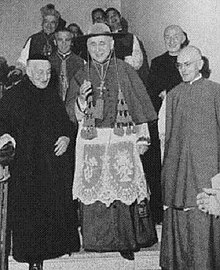
|
Giovanni Colombo, Italian
|
|
|
|
|
|
|
|
|
|
|
|
|
|
| Image | Name | |
|---|
Missing

|
József Mindszenty, Esztergom, Hungary
|
- During World War II he was imprisoned by the pro-Nazi authorities.
- After WWII, he opposed communism and the communist persecution in his country. As a result, he was tortured and given a life sentence in a 1949 show trial that generated worldwide condemnation, including a United Nations resolution.
- On 12 February 1949, Pope Pacelli announced the excommunication of all persons involved in the trial and conviction of Mindszenty. In his apostolic letter, Acerrimo moerore, he publicly condemned the jailing of the cardinal and stated he was being mistreated.
- After eight years in prison, he was freed in the Hungarian Revolution of 1956 and granted political asylum by the United States embassy in Budapest, where he lived for the next fifteen years.
- On the opening day of the council, when over 2,000 prelates paraded into St. Peter's, the international press corps was silent about the absence of prelates from communist regimes. The press was mute about Cardinal Mindszenty, Archbishop Slipyj, all the North Korean bishops, & all the North Vietnamese bishops.
|

|
Hans Urs von Balthasar, Swiss
|
|

|
Pierre Teilhard de Chardin, French Jesuit
|
|
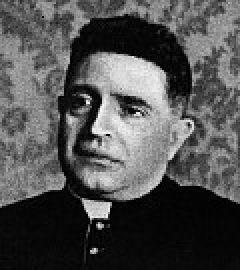
|
Domenico Tardini, Italy
|
- A long-time aide to Pope Pacelli in the Secretariat of State. Pope Roncalli named him Cardinal Secretary of State and, the most prominent position in the Roman Curia. Died July 1961.
- On 20 Jan 1959, Pope Roncalli summoned Cardinal Tardini to float the idea of an Ecumenical Council.
- Presided over Ante-Preparatory Committee.
|
|
|
|
|
|
|
|
|
|
|
|
|







.jpg)













.jpg)




















.jpg)





















